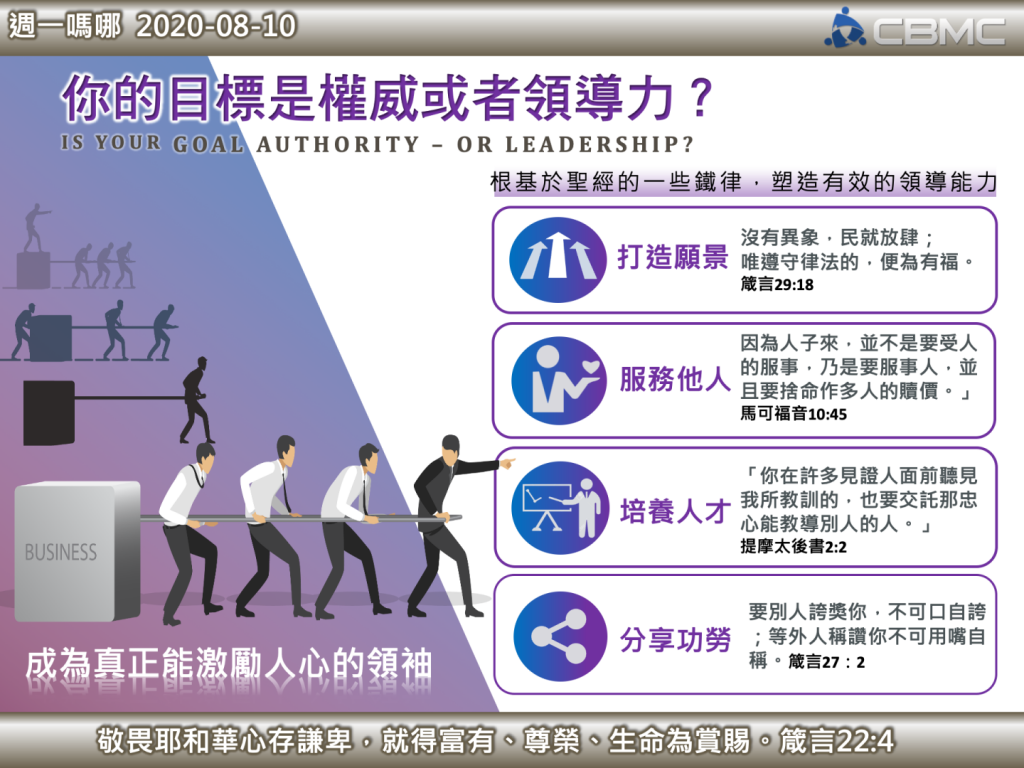你的目標是權威或者領導力?──IS YOUR GOAL AUTHORITY – OR LEADERSHIP?
我聽過有人明智地觀察到:「有些人的問題是:當他們有了總裁的名份時,他們就突然覺得自己要表現得像個總裁」你注意到了嗎?這些人突然覺得為了要配得上這個頭銜,他們必需展現他們的領導肌肉。
顧問Tim Kight表示:「組織可以給你職位,但只有你自己能讓你成為領袖。」被賦予的頭銜和權威不會讓人變成真正的領袖,就像一個人進入車庫不會變成汽車一樣。真正的領導力是贏來的,不是被賦予的。
有人說,要確定你是不是領袖的唯一方法是轉身看看是否有人在跟隨你。真正值得跟隨的領袖有哪些特點?以下是根基於聖經的一些鐵律,對塑造有效的領導能力很有幫助:
打造願景。無論是在營利、非營利組織、教會還是運動團隊中,人們都希望知道他們將往何處去。一個有效的領袖可以打造願景,指明道路。「沒有異象(或譯:默示),民就放肆;惟遵守律法的,便為有福。」(箴言29章18節)
耶穌基督(有史以來最偉大的領袖)在帶領門徒三年之後,在升天之前就給他們清晰以及雄心壯志的願景。他說:「所以,你們要去,使萬民作我的門徒,奉父、子、聖靈的名給他們施洗(或譯:給他們施洗,歸於父、子、聖靈的名)。」「凡我所吩咐你們的,都教訓他們遵守,我就常與你們同在,直到世界的末了。」(馬太福音28章19-20節)。
服務他人。我曾為期待我為他們服務的老闆工作,也曾為渴望為我個人和他們所負責的所有人服務的老闆工作。你認為哪些老闆我更願意以工作回報並且給予毋庸置疑的忠誠?耶穌再次展示了這種領導能力,用很多種方式為別人服務,包括去洗那些門徒們經一天旅行後骯髒的腳。「因為人子來,並不是要受人的服事,乃是要服事人,並且要捨命作多人的贖價。」(馬可福音10章45節)。如果有必要,你願意為跟隨你的人獻出自己的生命嗎?這正是耶穌所做的。「人為朋友捨命,人的愛心沒有比這個大的。」(約翰福音15章13節)。
培養人才。對領導者最真實的巨大考驗 – 測試他/她是否能留下遺產,就是當他們離開了公司,組織或事工後那個地方會發生什麼事。我們當中沒有一個人能永遠活著,因此,明智的領袖會努力培養人才,以便在自己退休、到其他職位甚至死亡而離開後,工作還能繼續。使徒保羅非常明白這一點,所以他勸告門徒/所提攜的提摩太,「你在許多見證人面前聽見我所教訓的,也要交託那忠心能教導別人的人。」(提摩太後書2章2節)。
分享功勞。吉姆.柯林斯(Jim Collins)在他的經典管理著作《從A到A+》(Good to Great)描述一位傑出的領袖絕對會拒絕獨佔公司成功的功勞,而會歸功於自己很幸運能擁有出色的同事、前領袖以及接班人。當大多數員工知道自己能分享工作的功勞時,就會毫不猶豫地全力以赴。「要別人誇獎你,不可用口自誇;等外人稱讚你,不可用嘴自稱。」(箴言27章2節)。
© 2020. Robert J. Tamasy 是企業巔峰: 給今日職場從箴言而來永恆的智慧 一書的作者。也與導師之的作者David A. Stoddard 合著Tufting Legacies。編輯多本著作包括Mike Landry. Bob的書: 透過苦難成長。Mike Landry. Bob的網站為www.bobtamasy-readywriterink.com
反省與問題討論
- 你如何定義「權威」以及「領導力」?你是否同意兩者之間有差別?請分享原因。
- 如果要列出成為有效率的領袖的必要特質,你會列出哪些?
- 本週週一嗎哪所描述的哪些領袖特質對你個人來說最引起你的注意,並認為是最重要?請釋你的答案。
- 你是否遇過真正能激勵人心的領袖?個人和專業素質很高,甚至於他領導的人願意為他突破一道牆?如果有,你覺得是什麼特質讓他與眾不同?他又如何發揮自己的權威?
備註:如果你有聖經,希望閱讀更多和這個主題相關的內容,請參考:
箴言10章7節
10:7 義人的紀念被稱讚;惡人的名字必朽爛。
箴言11章30節
11:30 義人所結的果子就是生命樹;有智慧的,必能得人。
箴言11章2節
11:2 驕傲來,羞恥也來;謙遜人卻有智慧。
箴言22章4節
22:4 敬畏耶和華心存謙卑,就得富有、尊榮、生命為賞賜。
箴言28章2、16節
28:2 邦國因有罪過,君王就多更換;因有聰明知識的人,國必長存。
28:16 無知的君多行暴虐;以貪財為可恨的,必年長日久。
馬可福音12章28-31節
12:28 有一個文士來,聽見他們辯論,曉得耶穌回答的好,就問他說:「誡命中哪是第一要緊的呢?」
12:29 耶穌回答說:「第一要緊的就是說:『以色列啊,你要聽,主─我們 神是獨一的主。
12:30 你要盡心、盡性、盡意、盡力愛主─你的 神。』
12:31 其次就是說:『要愛人如己。』再沒有比這兩條誡命更大的了。」
腓立比書4章9節
4:9 你們在我身上所學習的,所領受的,所聽見的,所看見的,這些事你們都要去行,賜平安的神就必與你們同在。

IS YOUR GOAL AUTHORITY – OR LEADERSHIP?
By Robert J.Tamasy
One time I heard someone wisely observe, “The problem with some people being named president of their company is that suddenly they think they need to start acting presidential.” Have you noticed that? Individuals suddenly feeling that they have to live up to their title by flexing their executive muscle.
Consultant Tim Kight says, “Your organization can put you in a position of authority, but only you can put yourself in a position of leadership.” Being given a title and the authority that comes with it does not make someone a genuine leader any more than going into a garage makes someone a car. True leadership is earned, not bestowed.
It has been said that the only way to determine if you are a leader is to turn around to see if anyone is following you. So, what are some of the traits of a real leader, someone deserving of being followed? Here are some principles, firmly grounded in the Scriptures, that help to shape effective leadership:
Casting vision. Regardless whether they are in a for-profit company, a non-profit organization, a church or an athletic team, people like to know where they are going, what their goals are. An effective leader casts vision, shows the way. “Where there is no vision, the people perish [are unrestrained]” (Proverbs 29:18).
After three years of leading His disciples, Jesus Christ – the greatest leader of all time – cast a clear, ambitious vision for them before ascending to heaven. He said, “Go therefore and make disciples of all nations…teaching them to observe all that I have commanded you” (Matthew 28:19-20).
Serving others. I have worked for bosses who expected me to serve them, and I have worked for bosses who were eager to serve me and everyone else for whom they were responsible. Who do you think were the easiest to serve in return, to give unquestioned loyalty? Again, Jesus demonstrated such leadership, serving others in a variety of ways, including washing their dirty, sandaled feet after a long day of traveling. “For even the Son of Man did not come to be served, but to serve, and to give His life as a ransom for many” (Mark 10:45). If necessary, would you be willing to give your own life for those who follow you? This is exactly what Jesus did. “Greater love has no one than this, that one lay down his life for his friends” (John 15:13).
Developing people. There is a truism that the greatest test of a leader – his or her enduring legacy – is what happens to the company, organization or mission after they are gone. Not one of us will live forever, so the wise leader strives to train and develop others so they can continue the work once they have left due to retirement, taking another position, or even death. The apostle Paul understood this well, exhorting his disciple/protégé Timothy, “And the things you have heard me say in the presence of many witnesses entrust to reliable men who will also be qualified to teach others” (2 Timothy 2:2).
Sharing the credit. In his classic book on management, Good to Great, Jim Collins writes of a leader that, “flat-out refused to take credit for his company’s success, attributing his good fortune to having great colleagues, successors, and predecessors.” Most workers will not hesitate to give their best when they know they will share in the credit for the work. “Let another praise you, and not your own mouth; someone else, and not your own lips” (Proverbs 27:2).
© 2020. Robert J. Tamasy has written numerous books, including Marketplace Ambassadors: CBMC’s Continuing Legacy of Evangelism and Discipleship; Business at Its Best: Timeless Wisdom from Proverbs for Today’s Workplace; Tufting Legacies;The Heart of Mentoring, coauthored with David A. Stoddard; and has edited other books. Bob’s biweekly blog is: www.bobtamasy.blogspot.com.
Reflection/Discussion Questions
- How would you define “authority”? How would you define “leadership”? Do you agree that there is a difference between the two? Why or why not?
- What would you include if compiling a list of the necessary traits for being or becoming an effective leader?
- Which of the qualities described in this “Monday Manna” stands out for you personally, seems most important? Explain your answer.
- Have you known a leader who was truly inspirational, whose personal and professional qualities were such that the people he or she led would be willing to run through a proverbial wall for them, if asked? If so, what made that person outstanding? How did they exert their authority?
NOTE: If you have a Bible and would like to read more about this subject, consider the following passages:
Proverbs 10:7, 11:30, 11:2, 22:4, 28:2,16; Mark 12:28-31; Philippians 4:9


